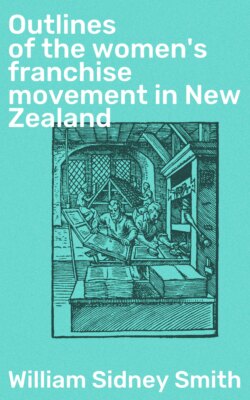Читать книгу Outlines of the women's franchise movement in New Zealand - William Sidney Smith - Страница 4
На сайте Литреса книга снята с продажи.
Оглавление
CHAPTER I
Table of Contents
TO Mrs. Mary Müller belongs the honour of being the pioneer worker for the enfranchisement of women in New Zealand. Mrs. Müller, an English lady, left England in the ship Pekin in 1849, and landed at Nelson, N. Z., in January, 1850. In 1852 she married the late Dr. Müller, who became Provincial Secretary of Nelson when the provinces were constituted, Mr. Stafford (afterwards Sir Edward) being the Superintendent.
In 1857 Dr. Müller was appointed Resident Magistrate for the district of Wairau. This district was then part of the province of Nelson, but was afterwards formed into the province of Marlborough. Had Mr. Gilbert, the witty librettist, known more of early colonial life, he would have been aware of numbers of able and many-sided public officers whose varied duties quite outrivalled those of the famous Pooh Bah. Dr. Müller held the position of Resident Magistrate for 22 years, and during the early part of that period set up Customs, Postal, and indeed every other department of Government, filling, at one time, no fewer than thirteen offices himself.
For some years before leaving England the injustice of the law towards women was impressed on the mind of Mrs. Müller. It was therefore hardly to be wondered at that, living in New Zealand in the epoch-making fifties, and associating with such nation builders as Sir William Fox, Alfred Saunders, Sir David Monro, Sir E. W. Stafford, and Alfred Domett, Mrs. Müller should feel that in this new land women, as well as men, should be free.
Quietly and unobtrusively, in frequent conversation with those early law makers, Mrs. Müller suggested the equity of the enfranchisement of women. But while for the greater part they listened with courteous apathy, there were some—Sir David Monro among them—who were heartily shocked at so scandalous a suggestion. Dr. Müller, too, was strongly opposed to woman suffrage. A good and learned man, an affectionate husband, he was rigid in his views as to the impropriety of women manifesting an interest in politics. It is probable, too, that his position as an administrator of the law strengthened his disapproval of his wife taking any part in an agitation for its reform.
Whether this was so or not, Mrs. Müller was confronted with a choice between domestic concord and the advocacy of views that she felt to be both just and urgent. In this painful dilemma Mr. Charles Elliott, a relative by marriage, came to the rescue.
Mr. Elliot was not only a member of Parliament but, more important still, was the proprietor of the Nelson Examiner which at that time was probably the most influential newspaper in the colony. He proved himself to be a real friend in need. Carefully preserving Mrs. Müller's anonymity, he received and forwarded her correspondence, placed the columns of his own paper at her disposal, and procured publication for her articles in papers in other parts of the colony. Certainly among the men who have rendered unacknowledged service to the cause of woman in New Zealand the name of Mr. Charles Elliott stands high.
In 1869, Mrs. Müller, under the nom de plume of "Femina," issued a pamphlet, entitled, "An Appeal to the Men of New Zealand." Its publication drew from John Stuart Mill a most encouraging letter and a copy of his "Subjection of Women," just then published. A useful correspondence with Mrs. P. A. Taylor, the Honorary Secretary of the London Society, was also commenced. Finding that the time for the complete emancipation of women had not arrived, Mrs. Müller turned her energies in the direction of obtaining some immediate relief, and had the satisfaction of seeing the "Married Women's Property Act" passed. Advancing years, and the difficulty of conducting a
| MRS.MARY MÜLLER. |
secret propaganda, compelled Mrs. Müller to relinquish her work. One of her most cherished wishes was that New Zealand should lead the way in the enfranchisement of women. Mrs. Müller has lived to see her desire accomplished. Over eighty years of age, she still lives at New Amersfoort, Blenheim. Frail in body, but with a youthful heart and still vigorous intellect, Mrs. Müller rejoices to see the work begun with pain and difficulty fifty years ago brought at last to a successful completion.
[1]
1 ↑ This was written in 1901. Mrs. Müller passed away in July, 1902.
